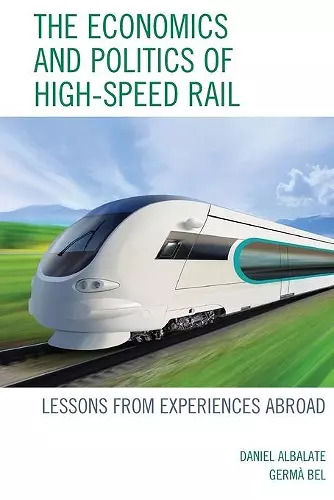The Economics and Politics of High-Speed Rail
Lessons from Experiences Abroad
Daniel Albalate author Germà Bel author
Format:Paperback
Publisher:Bloomsbury Publishing PLC
Published:4th Dec '13
Currently unavailable, and unfortunately no date known when it will be back

The technological revolution linked to high speed rail (HSR) has been accompanied by myths and claims about its contribution to society and the economy. Although HSR is unquestionably a technological advance that has become a symbol of modernity, this review and analysis of the international experiences shows that the conditions necessary to have a positive impact, economically, socially and environmentally, are enormously restrictive. The Economics and Politics of High Speed Rail: Lessons from Experiences Abroad, by Daniel Albalate and Germà Bel, introduces the main questions policy makers and scholars should examine when considering and studying HSR implementation, with particular emphasis on the US’s recent interest in this technology and possible application in California. Albalate and Bel then review the experiences of the most significant implementations of HSR around the globe. This in-depth international perspective includes chapters on the pioneers of HSR (Japan and France), the European followers (Germany, Spain and Italy), as well as Asian experiences in China, Taiwan, and Korea.
Albalate and Bel’s study provides a clear distinction between the myths and realities associated with this transportation innovation. Among the most relevant findings, this study highlights how HSR projects that do not satisfy highly restrictive conditions—on mobility patterns, measured costs, and economically rational designs—that make it desirable have been the source of huge financial debacles and the economic failure of HSR in most cases, which result in unfortunate consequences for taxpayers. The Economics and Politics of High Speed Rail is a rigorous investigation of the economic and political challenges and ramifications of implementing new public transportation technology.
Two Spanish economics professors have written this book to inform the debate on high-speed rail (HSR) in the US, using the international HSR experience. Most valuable are the separate chapters describing HSR in Japan, France, Germany, Spain, and China. These chapters include sections titled Objectives and Motivation; Structure, Design and Functions; Spending and Profitability; Demand and Modal Competition; Economic and Regional Impacts; and Environment and Other Externalities. The experiences are sobering for anyone thinking HSR can be built and operated profitably in the US. Public-private partnership (PPP) advocates, take note. The book warns strongly against political pressures to build HSR in less populated areas since HSR has drained economic activity from smaller cities to the major cities. Instead, HSR should connect only hubs with significant existing travel markets since HSR does not significantly increase (‘induce’) travel. The bibliography and index are excellent. There is no comparable published book, despite the burgeoning literature on HSR. Summing Up: Highly recommended. Students, upper-division undergraduate and up; faculty and researchers; professionals; general readers. * Choice Reviews *
The Economics and Politics of High Speed Rail provides a very methodical look at the basic economics and, to a lesser extent, politics behind the growth in high-speed rail (HSR) services around the world. ...The book, is in fact, largely a synthesis of what others have found regarding the HSR networks that a number of countries have developed. This approach makes the volume a very accessible read. ...Those with an interest in the development of HSR will certainly find a wealth of information systematically presented on its development together with an outline of some elements of its impacts. * E-International Relations *
This authoritative contribution to the literature on high-speed rail is rigorous, comprehensive, and timely. This book is a must-read for anyone truly interested in understanding the economics and politics of high-speed rail. -- Rick Geddes, Cornell University
Albalate and Bel have written a book that should be required reading for transportation planners and government policymakers in the US. They chronicle the experience with HSR from around the world and distill important lessons for the US. They challenge policymakers to "renounce the modernity offered by HSR" and instead look closely at territorial, mobility, demographic, and economic characteristics of their location to decide if HSR is the best investment. Albalate and Bel write a careful analysis of HSR efforts in Japan, France, Spain, Germany, Italy, China, So. Korea, Taiwan and the US – showing difference in finance (public, private and mixed), territory, emphasis on passenger or freight, changes in consumer demand and impacts on economic development in the nodes and the wider region. Their overall conclusion: "Caution." -- Mildred E. Warner, Cornell University
[Daniel Albalate and Germà Bel] provide by far the most comprehensive review of the international experience with high speed rail in Europe and Asia, and mine it for insights on the circumstances in which high speed rail is financially viable, environmentally sensible, and politically irresistible. It’s a cautionary tale of how infrastructure systems can get overbuilt. -- Jose A. Gomez-Ibanez, Harvard University
ISBN: 9780739190685
Dimensions: 229mm x 154mm x 14mm
Weight: 340g
210 pages